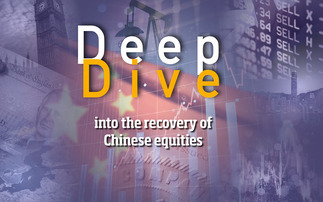Industry Voice: Tapping into the forgotten EM opportunities
Incessant investor demand for exposure to new economy sectors - such as tech and healthcare - has driven valuations of many of the emerging world's high growth companies to historical highs. Investors have ignored traditional value sectors - such as banks, insurance companies and industrials - despite rapidly improving free cash flow. The divergence of valuations between new and old economy stocks is now at the widest levels in the last 20 years.
Value is a neglected asset class in emerging markets
In some sense, this demand is not surprising, since emerging markets (EM) tend to be associated with high growth. A survey of the current EM investment universe shows that around 87% of all active money is in core or growth portfolios.
Yet, for Value investors, this has created many areas that are being overlooked or forgotten. For example, I can currently buy some of what I believe are the best franchise banks in emerging markets, at historically low prices. Whereas financials in developed markets are struggling due to depressed 10-year bond yields, the yield curve in some central and eastern European countries, as well as China, has been steepening for two years.
But value is different in EM
However, Value investing in EM is very different from Value investing in developed markets. Being cheap alone is not enough. For example, many Value investors in developed markets will focus on buying "falling star" companies, average down the cost, and then wait for a catalyst to trigger mean reversion.
We do not wait for mean reversion, instead we seek to actively get ahead of fundamental changes. Cheap stocks can stay cheap for a very long time in EM due to opaque ownership structures, weaker governance and a prevalence of family and state-owned companies, among other factors. There are also very few takeover stories or leveraged buyouts, meaning there are limited opportunities to buy companies at genuinely cheap Price/Earnings or Price/Book ratios and simply wait for them to pay off.
In addition to cheap valuations, another trap for many investors in EM can be controversial areas of the market. A lot of people are talking about Argentina and Turkey in emerging markets today. Both countries have sold off significantly this year, down over 50% and over 40% respectively1. Are they my type of idea? No, because they're controversial. Instead, I like to work in countries, sectors, stocks that no one is talking about, where the downside risk tends to be more limited versus controversial stocks. We focus our research efforts on identifying good quality companies that have been forgotten by investors and that have a solid potential for re-rating, or an expansion in valuations.
Forgotten stocks give us an edge
Our Emerging Markets Value Equity Strategy has just passed its three-year anniversary and I am seeing more opportunities now than at any other time over that period. In terms of geography, I would highlight the Middle East. If you look at stock valuations in many of these countries, it's near historical lows. While the oil price has staged a recent recovery, stocks have not moved. To me that's a disconnection.
In addition, we like South Africa, where we own select financials, including Nedbank, the country's fourth largest lender, and financial services company Absa. Both are leveraged to the country's macro recovery cycle, and have healthy exposure to continental Africa, a part of the world much neglected by investors, but a region where we see signs of solid recovery.
State-owned enterprises (SOEs) also represent good opportunities in our view. Investors tend to have a negative view of these businesses, and in many cases rightly so, but we maintain that it is possible to uncover good quality SOEs. One example here would be Sinopec Engineering, the Chinese Construction and Engineering firm. In our view, Sinopec Engineering should experience a rebound in new orders for downstream projects within China's oil and gas industry, where there has been underinvestment over the past few years. We believe the company's earnings have now troughed and that the prospect for those earnings is improving.
Given many investors continue to focus on quality-growth names and neglect the many misunderstood and undervalued companies in the EM space, we believe EM remains a fertile hunting ground for Value opportunities.
1Source: MSCI. MSCI makes no express or implied warranties or representations and shall have no liability whatsoever with respect to any MSCI data contained herein. The MSCI data may not be further redistributed or used as a basis for other indices or any securities or financial products. This report is not approved, reviewed, or produced by MSCI.
Key Risks
Transactions in securities denominated in foreign currencies are subject to fluctuations in exchange rates which may affect the value of an investment. Returns can be more volatile than other, more developed, markets due to changes in market, political and economic conditions. The fund has increased risk due to its ability to employ both growth and value approaches in pursuit of long-term capital appreciation.
IMPORTANT INFORMATION
This material is being furnished for general informational purposes only. The material does not constitute or undertake to give advice of any nature, including fiduciary investment advice, and prospective investors are recommended to seek independent legal, financial and tax advice before making any investment decision. T. Rowe Price group of companies including T. Rowe Price Associates, Inc. and/or its affiliates receive revenue from T. Rowe Price investment products and services. Past performance is not a reliable indicator of future performance. The value of an investment and any income from it can go down as well as up. Investors may get back less than the amount invested.
The material does not constitute a distribution, an offer, an invitation, a personal or general recommendation or solicitation to sell or buy any securities in any jurisdiction or to conduct any particular investment activity. The material has not been reviewed by any regulatory authority in any jurisdiction.
Information and opinions presented have been obtained or derived from sources believed to be reliable and current; however, we cannot guarantee the sources' accuracy or completeness. There is no guarantee that any forecasts made will come to pass. The views contained herein are as of the date noted on the material and are subject to change without notice; these views may differ from those of other T. Rowe Price group companies and/or associates. Under no circumstances should the material, in whole or in part, be copied or redistributed without consent from T. Rowe Price.
The material is not intended for use by persons in jurisdictions which prohibit or restrict the distribution of the material and in certain countries the material is provided upon specific request.
It is not intended for distribution to retail investors in any jurisdiction.













